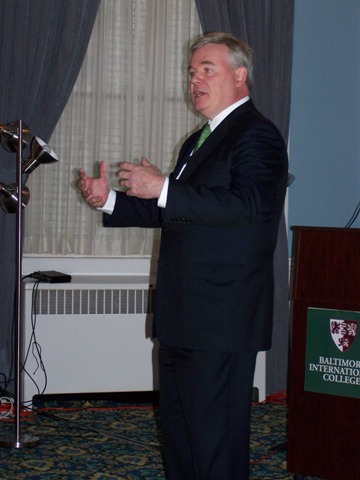Chefs Speak Out: a New Definition of Great
15 July 2010By Lynn Schwartz
 At CAFÉ’s 2010 Leadership Conference, the president of The Culinary Institute of America revealed a food democracy afoot: an endless variety of great foods served quickly, anywhere, anytime to anyone.
At CAFÉ’s 2010 Leadership Conference, the president of The Culinary Institute of America revealed a food democracy afoot: an endless variety of great foods served quickly, anywhere, anytime to anyone.
From the helm of The Culinary Institute of America, Dr. Timothy Ryan, CMC, has a unique vantage point—an overview of a rapidly diversifying hospitality industry. A 1977 graduate of the prestigious CIA, Ryan is the first alumnus and first faculty member to become president. Throughout his career, he has received numerous gold medals in international competitions and captained the team that won the World Championship at the 1988 “Culinary Olympics.” He was also among the youngest chefs to become a Certified Master Chef and the youngest president of the American Culinary Federation.
This expansive experience gives Ryan the ability to take large amounts of trend information and distill it into an accessible discussion. Recently, at the 6th-Annual CAFÉ Leadership Conference in
A Pivotal Year
Ryan touts 1946 as a year worth examining. “This was a year of innovation and inspiration,” says Ryan. “It was the end of World War II, people had pent-up energy and new ideas flourished.”
1946 is the year when the United Nations is founded, the Baby Boom begins, Xerox produces the first copier, the computer is born and so is
The culinary industry is not excluded. McDonald’s is launched, which begins the fast-food revolution, and a school is founded in
The New Definition of Great
Extraordinary changes have been made since 1946. “Chefs have become noble and dignified, no longer stereotyped as drunken louts and losers,” says Ryan. “The rest of the world does look to the United States for culinary inspiration.” The perception of the American chef is not the only change. How we define great food and great ingredients has also evolved to embrace the diversity of our population. Simply, great food must no longer be defined as French.
In the past, only French restaurants and French food were synonymous with great. Restaurants like Le Pavillon, Lutèce and Café des Artistes dominated fine dining. These establishments were exclusive, expensive and formal. “Waiters donned tuxedos and the wine list was indecipherable to most Americans,” Ryan says.
Today, the answer to “Where do you get great food?” has been turned upside down. Diners now flock to places like momofuku’s, a minimalist noodle bar in
Or great food can be defined as a Korean Mexican taco served from the Kogi truck, delicious food that reflects the rhythms of
Racing to the Future
But don’t conclude that fine dining is dead. “We have more high-powered, fabulous chefs in America then we have ever had,” says Ryan. “Fine dining is going strong. But there are other styles and choices that are emerging to be great, as well.”
Ryan predicts that global flavors, nutrition, food ethics and food democracy will define our culinary future. “The Internet age and travel have caused an explosion of new foods,” he says. Asian and Latin American cuisines are booming.
We also want to understand nutrition and fair trade. We buy fresh and local; we are interested in sustainability and animal rights. There is a food democracy afoot, which Ryan describes as “an endless variety of great foods served quickly, anywhere, anytime to anyone.”
So what does this mean for those wishing to enter an evolving and fast-paced environment? “This is an industry with tremendous opportunity,” says Ryan, “an industry that embraces all colors and backgrounds. One can still go from the dishroom to the boardroom. But there are higher expectations of proficiency required from chefs. This creates a need for higher levels of education, and with so much knowledge, there will be the necessity to specialize.”
And while there seems to be unlimited opportunity for those who have the talent and who will do the work, there is the reality that not every chef will become a celebrity or television superstar. Ryan has a good answer for that, too. “You can make a great living, be fulfilled with your work and respected. You can be a leader in the community,” he says. “Tell me, what’s wrong with that?
Lynn Schwartz is a writer and former New York City restaurateur. She is currently the show manager for The Food & Wine Festival at National Harbor. She is based in Maryland.
Additional Info
- CAFÉ Talks Podcast Lesson Plan: 8
